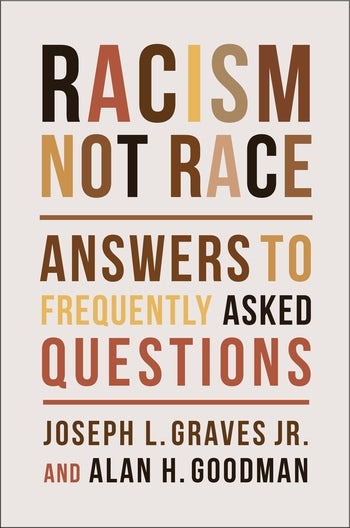Racism, Not Race: Answers to Frequently Asked QuestionsPosted in Books, Health/Medicine/Genetics, Media Archive, Monographs, Philosophy on 2022-05-15 19:00Z by Steven |
Racism, Not Race: Answers to Frequently Asked Questions
Columbia University Press
December 2021
320 pages
Hardcover ISBN: 9780231200660
Paperback ISBN: 9780231200677
E-book ISBN: 9780231553735
Joseph L. Graves Jr., is a professor in the Department of Biology at
North Carolina A&T State University
Alan H. Goodman, Professor of Biological Anthropology
Hampshire College
The science on race is clear. Common categories like “Black,” “white,” and “Asian” do not represent genetic differences among groups. But if race is a pernicious fiction according to natural science, it is all too significant in the day-to-day lives of racialized people across the globe. Inequities in health, wealth, and an array of other life outcomes cannot be explained without referring to “race”—but their true source is racism. What do we need to know about the pseudoscience of race in order to fight racism and fulfill human potential?
In this book, two distinguished scientists tackle common misconceptions about race, human biology, and racism. Using an accessible question-and-answer format, Joseph L. Graves Jr. and Alan H. Goodman explain the differences between social and biological notions of race. Although there are many meaningful human genetic variations, they do not map onto socially constructed racial categories. Drawing on evidence from both natural and social science, Graves and Goodman dismantle the malignant myth of gene-based racial difference. They demonstrate that the ideology of racism created races and show why the inequalities ascribed to race are in fact caused by racism.
Graves and Goodman provide persuasive and timely answers to key questions about race and racism for a moment when people of all backgrounds are striving for social justice. Racism, Not Race shows readers why antiracist principles are both just and backed by sound science.
Contents
- List of Questions
- Preface
- Introduction: What Are Race, Racism, and Human Variation?
- 1. How Did Race Become Biological?
- 2. Everything You Wanted to Know About Genetics and Race
- 3. Everything You Wanted to Know About Racism
- 4. Why Do Races Differ in Disease Incidence?
- 5. Life History, Aging, and Mortality
- 6. Athletics, Bodies, and Abilities
- 7. Intelligence, Brains, and Behaviors
- 8. Driving While Black and Other Deadly Realities of Institutional and Systemic Racism
- 9. DNA and Ancestry Testing
- 10. Race Names and “Race Mixing”
- 11. A World Without Racism?
- Conclusions
- Notes
- Index
